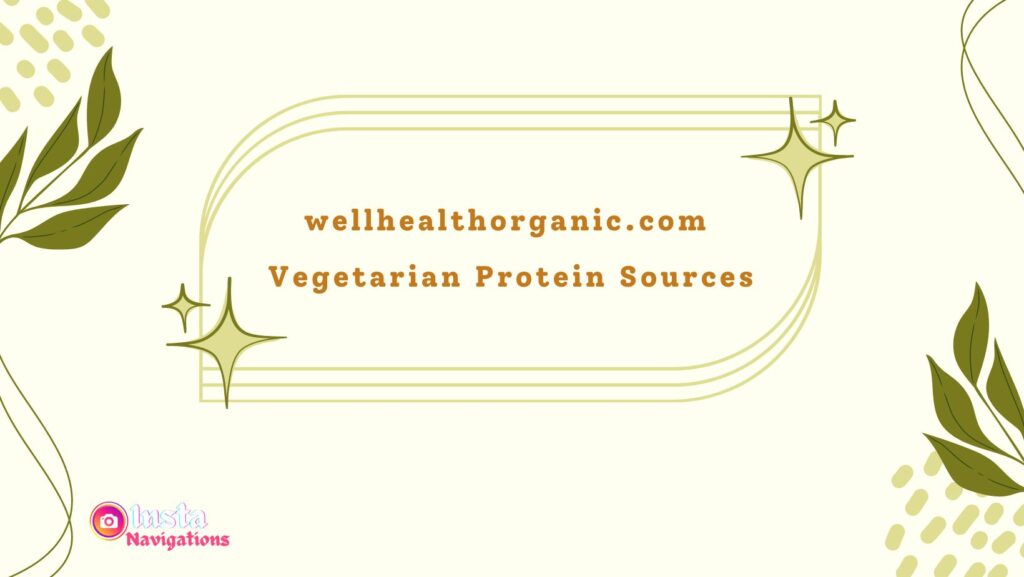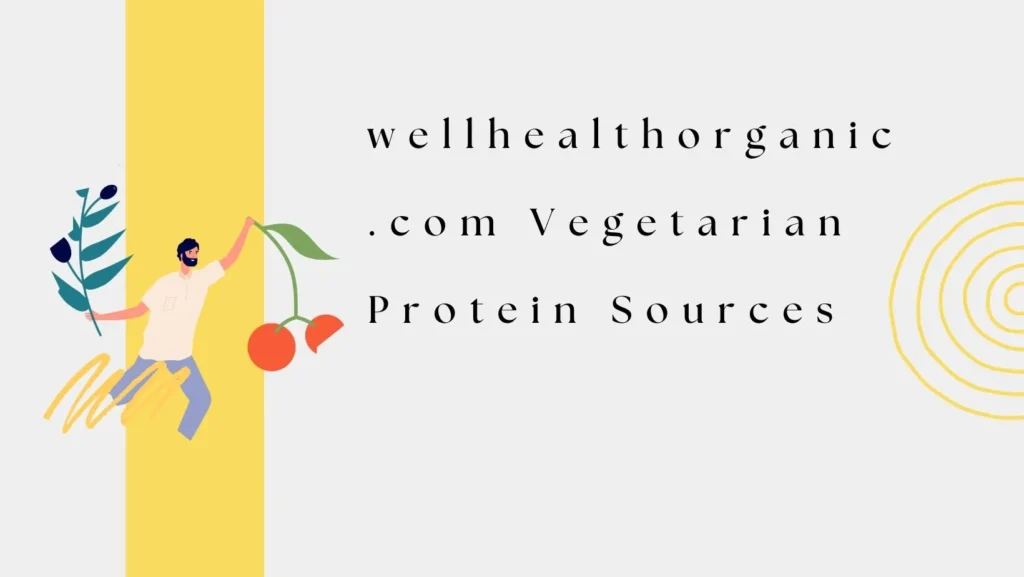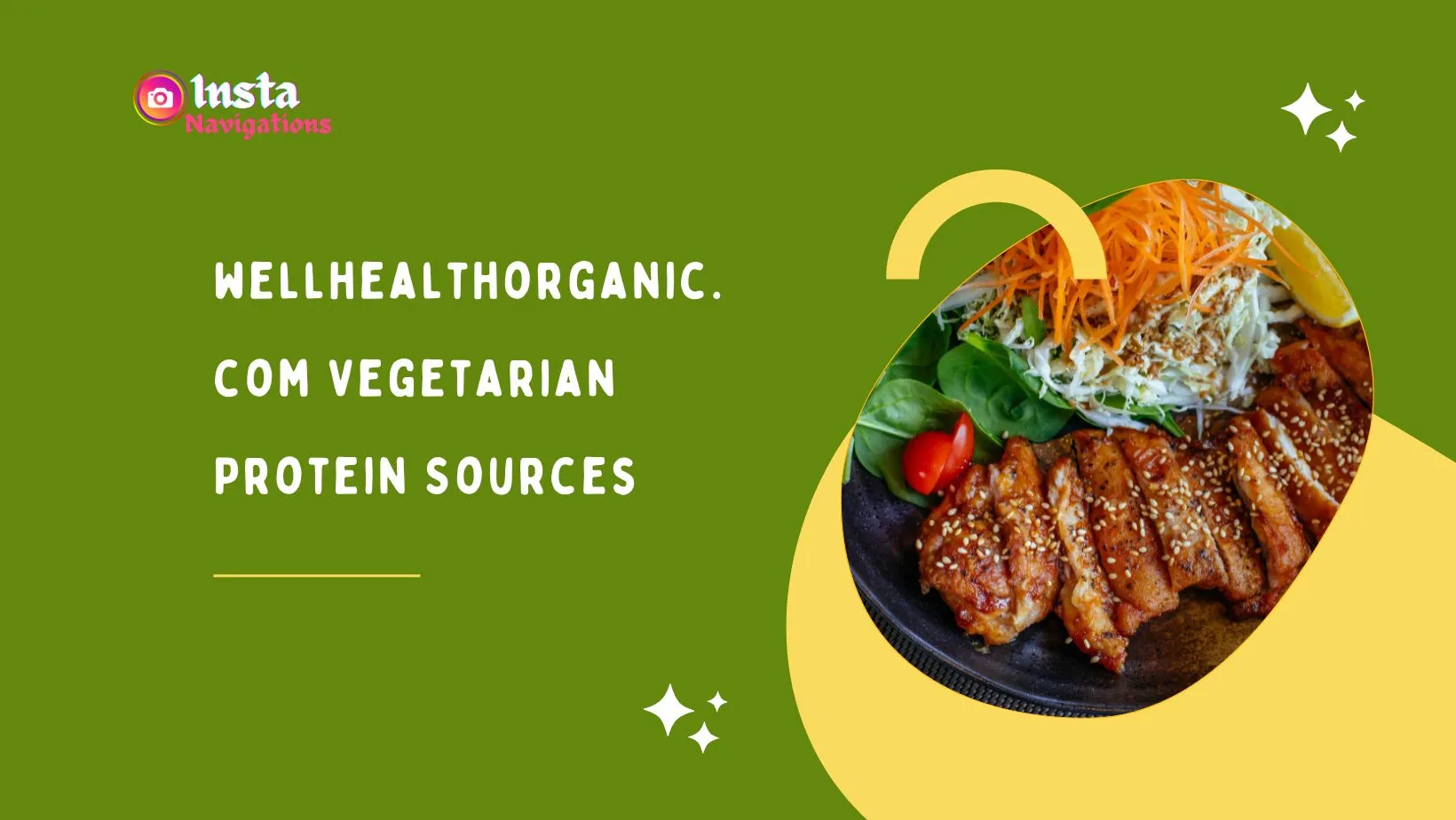Try these plant-based and vegetarian options to obtain your protein if you’re on a vegetarian diet.
wellhealthorganic.com: Vegetarian Protein Sources make it simple to meet your protein needs whether you’re following a vegetarian or vegan diet or are just attempting to eat less meat and more plants. Protein is an essential ingredient for skin and hair health as well as muscular growth and maintenance. It also keeps you feeling full.
It’s common to question where vegetarians obtain their protein, but following a vegetarian diet doesn’t make it difficult to consume the recommended amount. The Dietary Guidelines state that men require 56 grams of protein and women 46 grams. However, your age, activity level, and other factors may affect how much you require.
What Needs and How Much Protein can a Human Body Require?
The building block of the human body, protein is involved in the normal mending of muscles and tissues.”It helps your body produce antibodies to fight infections and improve the health of your muscles, tendons, and skin tissues. Healthy adults should get about 0.36 grams of protein per pound of body weight each day.”
For an adult weighing 150 pounds, that equates to roughly 54 grams. According to popular belief, animal protein is consumed worldwide. It has, however, had a number of drawbacks in recent years. For this reason, there has been a multiplicity of awareness regarding vegetable protein. The use of vegetable protein has increased significantly in nations like India.
A good amount of protein can be found in high-protein vegetables and seeds.

High-Protein Vegan Diet: Emphasizing Foods
Although nuts have the highest protein content per 100 grams and are the healthiest food, they also contain a high fat content in their calories. They make excellent portable snacks, or you can combine nut butters, like peanut butter, with other foods, such smoothies.
In terms of both protein content and calorie density, legumes are the most balanced vegan protein source. Dry beans are much more affordable, easily accessible, and seen as essential by most vegans. They don’t do well on the lists above because of their high fiber and water content.
Beans: In only half a cup, each type of bean can supply you 6 to 9 grams of protein and 6 to 8 grams of fiber to keep you feeling full. Additionally, beans may lower cholesterol and promote a healthy gut flora.
Grains: Although you generally associate grains mostly with carbohydrates, they are also a great source of protein. For your morning meals, for instance, a quarter cup of fresh barley or grain adds five to six grams of protein, while half a cup of oats provides five grams. Other excellent ancient grain options to add some variety to your meals are teff, millet, amaranth, and others.
Plant-based foods: You can supply plants. Protein content in dairy and pea milk substitutes is nearly equal to that of cow’s milk. Look for kinds that are sugar-free or mildly flavored.
Dietary Nutritional Yeast: The hidden component of many vegan “cheese” sauces, is an excellent source of B vitamins and protein. Two grams of protein are added to your meal with just one tablespoon sprinkled on top.
Vegetables: While they aren’t the most plentiful source of protein, consuming a lot of vegetables in your diet will provide you with a respectable amount of protein. For instance, a cup of cooked Brussels sprouts provides your meal with four grams of protein. These components are usable. A cup of sweet golden maize weighs five grams. Leafy greens, such bok choy, spinach, and watercress, are low in calories but high in protein per calorie.
Replacements for meat: While some plant-based meat substitutes are healthier than others, they can help meat lovers make the transition to a plant-based diet. Pick foods that are high in protein, have few ingredients, and have reasonable levels of saturated fats and sodium.
Eggs or whites: The greatest source of protein is eggs, which are also the least expensive, most readily available, and healthiest source of protein available. 6–8 grams are provided by each egg. The B vitamins, omega-3 fatty acids, and vitamin D found in the yolk of an egg are not present in white eggs, yet you will receive fewer calories from them anyway.
Dairy goods: The best source of the product is dairy products. Excellent sources of calcium and protein, these are used in the production of numerous foods, including butter, milk, cheese, and curd. Plain Greek yogurt might help you receive the most amount of protein from dairy products.
Then can be dressed up for a hearty breakfast or snack by adding fruit, nuts, or granola. Each serving of them has dairy ingredients that provide at least 13 grams of protein.
Seed: Seeds, like nuts, are an excellent source of unsaturated fats and protein. These are the sunflower seeds (each with 8 grams of protein per ounce) and pumpkin seeds (seven grams per ounce) from Select. Additionally, you may add hemp seeds—which contain roughly 10 grams per ounce—to your toast or porridge in the morning.
Peanuts: For every 100 grams, peanuts provide 25.8 grams of protein. The greatest food for vegan bodybuilders is peanuts, even though they aren’t strictly vegan. Peanuts taste great on their own, and adding peanut butter to a wide range of other foods is easier.
Almonds: Almond milk also has a high protein content, with 21.1 grams of protein per 100 grams of almonds. In general, people should restrict their intake of almonds and the ratio of omega-3 to omega-6 fat in nuts in order to obtain additional information.
Flaxseed: Finally, flaxseed completes our elite 8 with 18.3 grams of protein per 100 grams. Like seeds, flax is a great source of numerous vitamins and minerals and among the greatest vegan sources of omega-3 fats. It is best for most people to consume as much of this delicious cuisine as possible. Use it as a “vegan egg” in baked goods, smoothies, salads, and cereal.
Pumpkin Seeds: Pumpkin seeds contain 18.5 grams of protein per 100 grams, and they are healthy since they are an excellent source of minerals including copper, zinc, and magnesium in addition to protein. As with nuts, seeds (avoid sunflower seeds in particular) don’t always have a good omega-3 to 6 fat ratio.

Additional dietary factors for vegans and vegetarians are as follows:
- B12 vitamin.
- Calcium.
- Iron.
- zinc.
- Vitamin D.
- Fatty acids with omega-3 content.
Facts About the Nutrition of Chickpeas
Both fiber and protein are abundant in chickpeas. They include a number of important vitamins and minerals. Chickpeas can be a valuable source of nutrition, as they can lower the risk of type 2 diabetes and support healthy brain and nervous system function.
- 14.5g of protein
- 269 kcal
- 4.25 g of fat
- 44.9 grammes of carbs
- 12.5 grams of fiber
Nutritious facts about peanut butter
Peanut butter has a lot of calories and fat. Two tablespoons provides 25% of the daily required fat consumption, part of which is saturated fat. Furthermore, 1.4% of Americans, or around 4.6 million people, are allergic to peanuts, making them one of the eight most frequent food allergens in the country.
- 7 grams of protein
- 190 kcal
- 16g of fat and 7g of carbs
- Two grams of fiber
Nutritional information on lentils
Partition a variety of protein sources; orange, red, yellow, and black lentils are among the varieties of lentils. Lentils are a sensible and beneficial addition to any diet because of their potent nutritional profile, long shelf life, and simplicity of preparation.
- 17.9g of protein
- 230 kcal
- 0.75g fat and 39.8g carbs
- 15.6 grams of fiber
Nutritional information about Edamame
Furthermore, studies suggest that eating soy protein may help lower cholesterol and perhaps cut your chance of developing some types of cancer. Edamame, or green soybeans, are typically served with a similar quantity of sea salt on top. These beans are a great source of plant-based protein and also include significant amounts of fiber, essential vitamins, and minerals.
- 18.4 grams of protein
- 188 calories and 8g of fat
- 13.8 grams of carbs
- 8g fiber Nutrition facts for Tofu
Tofu, sometimes referred to as bean curd, is a soybean product with several health advantages. Including tofu in your diet can help maintain healthy bones, strengthen your heart, and offer a high-quality protein supply. Without tofu, the list of plant-based protein sources would be incomplete. It’s also time to dispel the myth that tofu is tasteless.
- 21.8 grams of protein
- 181 energy
- 11g fat and 3.5g carbs
- 2.9 grams of fiber
Nutritional information on oats
Numerous vitamins, minerals, and special plant chemicals can be found in abundance in oats. In addition to being well-known for its grain, they may also lower cholesterol, enhance insulin sensitivity, and make delicious recipes that go well with milk.
- six grams of protein
- 166 energy
- 3.56 g of fat
- 28.1 grams of carbs
- 4 grams of fiber
Nutrient information for walnuts
Walnuts can be incorporated to a wide variety of recipes, including savory and sweet desserts, in addition to being a wholesome, pleasant, and filling food. Walnuts are a great source of polyunsaturated fat, which is a heart-healthy fat with additional benefits.
- 220 kcal
- 22g of fat and 5g of carbs
- 5g protein and 2g fiber
- 5 grams of protein
Nutritious facts about almonds
Additionally, almonds are quite adaptable. A food that is abundant in nutrients and low in fat, almonds can be consumed raw or cooked. In addition, they weigh little. Almonds can be purchased uncooked, salted, roasted, or without salt. Almonds can be pulverized into almond meal or processed into almond butter or milk.
- 6 grams of protein
- 170 energy
- 15g of fat and 6g of carbs
- 4 grams of fiber
Nutrition information about flax seeds
Flaxseed, sometimes known as linseed or flax seed, can provide nutritional value to your diet. The little brown or golden seeds have a lot of fiber and heart-healthy fatty acids.
- 160 calories and 5g of protein
- 9 grams of carbs
- 12 grams of fat and 8 grams of fiber
- Nutritional information on soybeans
For nutrients, soybeans are the best source. Soybeans offer a wide range of nutritional applications since they are nutritious and high in protein. They can be consumed by mouth, drank as a substitute for milk, or taken as supplements.
- 31.3 grams of protein
- 401 energy
- 14.4 grams of carbs
- 10.4g fiber and 27.5g fat
- Nutrition information for peas
Nutrition information for peas
Green peas are a widely consumed vegetable. They also include a good amount of fiber, antioxidants, and other nutrients in equal measure.
- 12g of carbs and 70 calories
- 0g fat and 5g fiber
- Four grams of protein
Conclusion
Vegan diets can typically surpass their protein requirements provided that their energy intake in the form of calories or kilojoules is adequate and helpful to their health. However, it should be noted that certain vegan diets may be low in protein. Excellent wellhealthorganic.com Vegetarian Protein include legumes like beans, peas, lentils, nuts, and seeds. While there are numerous advantages to becoming a vegetarian, it may not be the best decision for everyone. Your general way of life, surroundings, mental state, and physical well-being will all benefit.
You may Also Read:
Choice Home Warranty George Foreman : A Complete Guide


